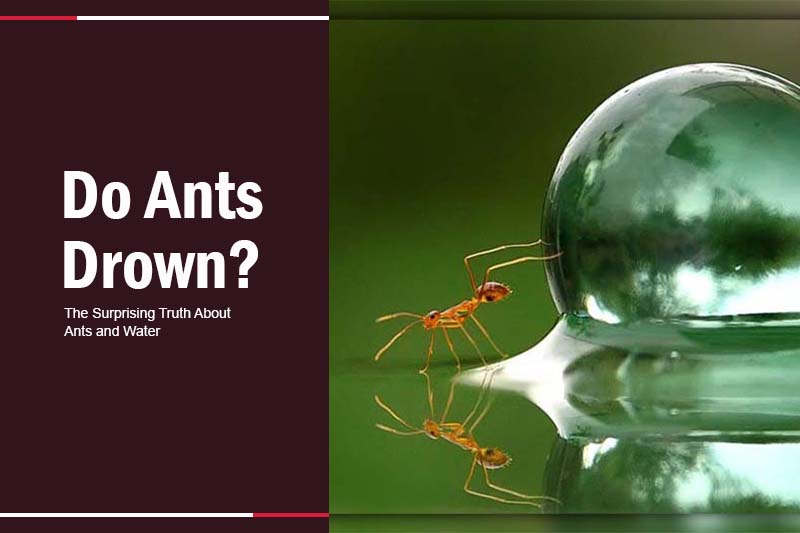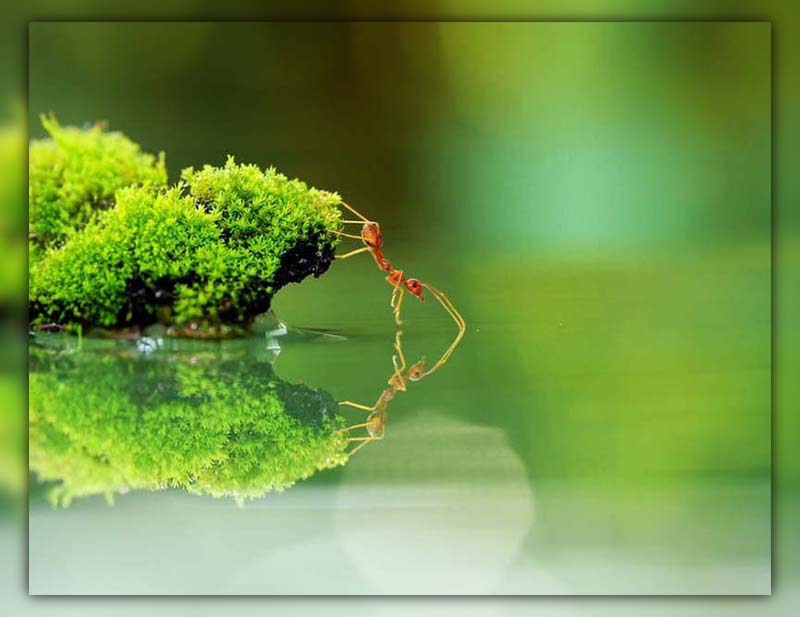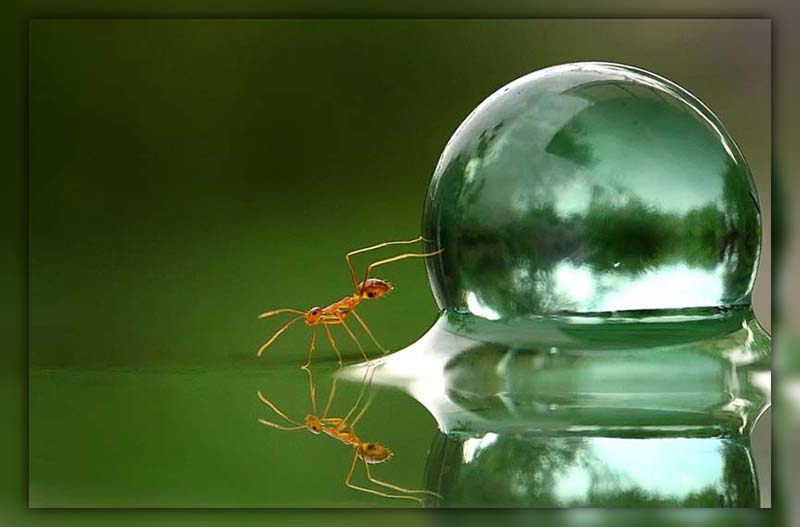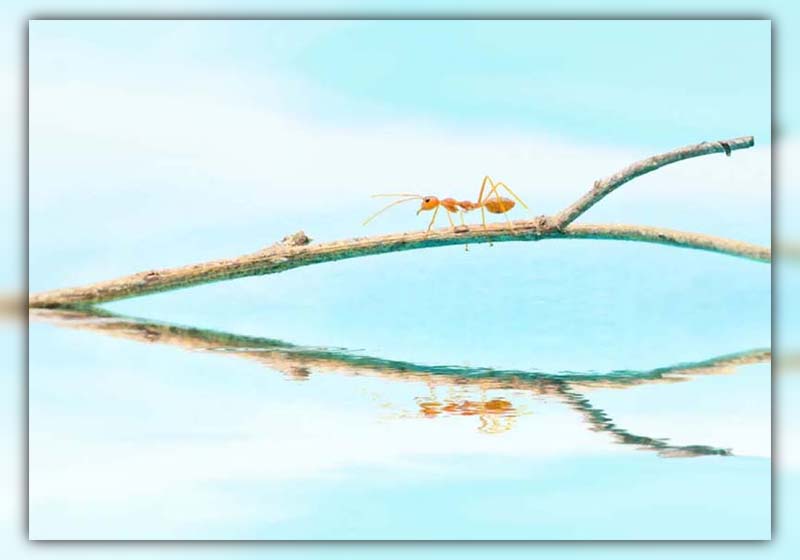Have you ever wondered if do ants drown? Do you think that flooding their nests with water is a good way to get rid of them? If you answered yes to these questions, then you need to read this blog post. Ants are amazing creatures that have some surprising abilities to survive in water.
In this article, you will learn how ants breathe, how they avoid drowning, and how they use water to their advantage.

Do Ants drown?
Yes, ants can drown if they are submerged in water for a prolonged period. Despite their ability to float on the water’s surface due to their hydrophobic exoskeleton, if they remain submerged for too long, water can clog their spiracles (tiny openings for breathing) and lead to suffocation.
Ants have evolved various strategies to avoid drowning, such as building rafts, forming air pockets, or escaping to higher ground when water levels rise.
How long does it take ants to drown?
Generally, ants can spend a minimum of 24 hours in water before drowning. Ants can close their spiracles when submerged underwater and hold their breaths for 24 hours or more.
Ant species may determine how long they take to drown. Also, the prevailing environmental conditions, including the water’s temperature, will affect how long ants can stay underwater before drowning.
Ants float naturally and enjoy a natural upthrust resulting from the water’s surface tension. Fire ants can spend up to two weeks on the water before reaching a new destination. However, they are also likely to drown.
The diving ant (Camponotus schmitzi) is the only species that can swim. The diving ant is an excellent swimmer and diver, and it can survive in water either afloat or submerged for longer than any other ant species. It is documented that they can spend as long as two weeks on the water and stay submerged for longer than 36 hours. They use the same mechanism of closing their spiracles as all other ants.
Extreme heat conditions can also influence ants to die faster when submerged. For instance, ants can easily freeze to death in very cold water. On the other hand, hot water melts their exoskeleton, exposing them to vulnerabilities and instant death.
In terms of moving water, fire ants are the best survivors. They form rafts by interlocking their feet and mandibles to increase their surface area in floodwaters. They usually carry their queen atop the natural raft and float over the flowing waters to their new destination.
Can ants swim, or will they sink?
Ants have a relatively low weight to stay afloat in water. Their weight does not allow them to break the water’s surface tension, making it almost impossible for them to sink in. However, you may spot ants walking on surfaces underwater.
For instance, you can spot an ant walking on the base of a glass of water. They rely on a suction system on their suction pads to hold onto surfaces. They also have a relatively small body mass that may not allow thrust in the water upward.
As per their swimming abilities, only the diver ants can swim. All other ants are very poor swimmers. Their feet are tiny and do not have the power to wade through water and create a forward movement. Instead, ants rely on the wind to blow them in stagnant waters. In moving water, ants will remain afloat to their next destination.
How long can ants breathe underwater?
Ants cannot breathe underwater because their systems are not designed to extract oxygen from water molecules. Instead, they usually shut their spiracles and hold their breath as long as they are submerged in water.
Most of the known ant species are known to survive for as long as 24 hours without oxygen. Other species, like fire ants and diving ants, can take longer because of adaptations. Also, it is important to note that water temperatures will significantly affect an ant’s ability to survive underwater.
Very cold temperatures require the body to generate more heat. Ants need oxygen for their bodily functions, facilitating heat generation. The implication is that they will survive for longer in warm temperate waters than in cold waters. The reason is that the need for oxygen intake increases with cooler temperatures. Hence, ants die faster in cold waters than in warmer waters.
How long can ants hold their breath underwater?
Ants can be some of the best divers in holding their breath underwater. Amazingly, the shortest recorded time for ants holding their breath underwater is 24 hours.
According to scientists, ants can close their spiracles (tiny pores in their bodies that help them take in oxygen) for that much time. Other ant species, like the diver ants are adapted to swimming and diving in liquids.
They are known to dive into plant sap in search of food. Diver ants can stay underwater longer than others based on their adaptability. These ants are specialist divers in more viscous liquids and can swim under such conditions. The implication is that they can do better in water because water is less viscous than most known plant saps.
Why do ants drown themselves?
Ants are some of the poorest swimmers and cannot move in the water. Even though ants cannot easily break the water’s surface tension, cases occur where ants find themselves sinking.
Normally, this happens when for some reason, the water’s surface tension breaks, and the thrust acting on an ant’s body becomes too weak. For example, it happens in soapy water as soap usually breaks the water’s surface tension.
If there were ants afloat in such waters, they automatically sink into the water. An ant in such a situation does not drown to death immediately. Instead, the ant will attempt to hold its breath for as long as it can before finding a solution. However, the solution might take too long to come. In such a case, an ant will give up due to fatigue.
It is important to note that an ant’s small body mass cannot allow it to float to the water’s surface. Therefore, the ant has no alternative but to accept its fate – drown. Some ants can also drown due to habitual practices.
Army ants are known to follow their leaders blindly. If the leader gets trapped in such a situation as drowning, all the other ants following it will likely drown. The concept is well explained in an ant mill situation where army ants can follow their leader in circles until they die due to exhaustion.
Are there ants that live in water?
In a recent discovery by a team of scientists from North Queensland, the Polyrhachis Sokolova is an ant species that live in water. This species of ants can swim and dive with relative ease. A good example is a diving ant.
Ants that live around water bodies can survive on water surfaces by holding on to each other to make an ant raft that keeps them floating. They also nest in submerged areas in the mangroves and usually hide in air pockets. The ants breathe like all other ants and usually swim to the surface to go about their other business.
You should note that ants rarely drown in water because they often stay afloat due to the lightweight nature that water’s surface tension can support. However, attempting to drown an ant physically may yield success, as ants also need oxygen to live.
They also need water to survive, so you will always find ants around the swimming pool, kitchen, or bathroom. Basically, those areas are always wet or moist, and ants will always thrive in such places. Ants in garden soil also tend to concentrate where there is enough moisture. That way, they are protected from the sun, and they will stay hydrated.
Conclusion
You have learned the answer to the question: Do ants drown? You have discovered that ants have some amazing adaptations to survive in water.
We hope you enjoyed this blog and found it useful and informative. If you want to learn more about pest control and gardening, please check out our other blogs at Pestweek.

Calina Mabel has over 15 years of experience in the field of journalism and communications. Currently, Calina Mabel is the Content Writer for categories such as Cockroach, Ants, Bed Bugs, Mosquito, Rodent, Termite, and Flies on Pestweek.com. She aims to build content for these categories with a focus on providing valuable and accessible information to readers, in order to create the world’s largest knowledge community about Pests.
All content written by Calina Mabel has been reviewed by Emily Carter.




